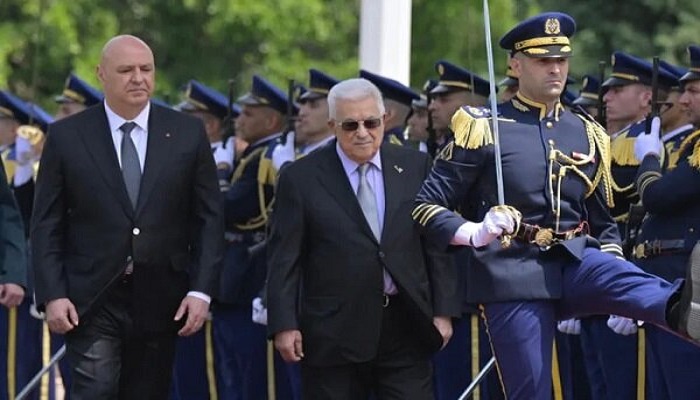PNN – The PA, headed by Mahmoud Abbas, who is accused of collaborating with the Zionists, is seeking to strengthen its position against resistance groups by moving towards disarming Palestinian groups in Lebanon.
Two weeks ago (May 21, 2025), Palestinian Authority President Mahmoud Abbas traveled to Beirut to meet with Joseph Aoun and other Lebanese security officials. During this short visit, the two sides discussed the latest situation in the Palestinian refugee camps, the issue of disarmament of Palestinian groups, and the latest status of refugee activities outside the camps.
According to the “Quds Security and Foreign Affairs Center”, by pursuing the issue of disarming Palestinian groups in Lebanon, the Aoun government intends to prove to the United States its principled policy of confronting Hezbollah’s weapons! Prior to this trip, on May 2, the Lebanese Supreme Defense Council warned the Hamas movement and other resistance groups to refrain from any attack on the occupied territories originating from Lebanese soil that could jeopardize the security and sovereignty of the country. The council threatened that any violation would be met with a severe reaction, namely expulsion from Lebanon. Accordingly, in the rest of this note, we will try to answer the reason for the Beirut-Ramallah agreement on the disarmament of Palestinian groups based in Lebanon.
Read more:
Israel’s plan to arm ISIS-affiliated groups in the Gaza Strip.
Implementation details of the plan to disarm Palestinian groups in Lebanon
The Lebanese Army is set to play a key role in implementing the agreement to disarm Palestinian groups. For the first time, Lebanese army units captured the camps and headquarters of the Popular Front for the Liberation of Palestine, the General Command and Fatah al-Intifada in the west, the center of the Bekaa Valley and Mount Lebanon, all of which are located outside the refugee camps scattered throughout the south, north and Bekaa. The Lebanese army seized and confiscated the equipment and ammunition of the aforementioned groups.
Dealing with the remaining 11 refugee camps is a more complicated matter. Of these 11 camps, 3 are directly affiliated with Fatah and there will be no problem in dealing with them. Other camps host entrenched groups and opposition factions that do not recognize Ramallah’s authority. Accordingly, it is anticipated that the issue of disarmament could become an open conflict between different factions. In this process, the most challenging camp for the Lebanese army will be “Ain al-Hilweh”, where resistance groups such as Hamas and Islamic Jihad are present.
The consequences of this decision for the axis of resistance
The Palestinian Authority President’s meeting with Lebanese President Joseph Aoun and their agreement to disarm Palestinian groups in 12 Lebanese refugee camps from mid-June is an event with profound implications. The agreement comes as Lebanon ostensibly seeks to consolidate domestic stability and win Western trust to receive foreign aid after a fragile ceasefire with Israel in February 2025.
This decision [to disarm the Palestinian Front] could lead to the weakening of the influence of the resistance circle. The Palestinian refugee camps, especially Ain al-Halweh, have served as operational and logistical bases for the resistance axis. The disarmament of these groups is accompanied by international pressure and the support of the Zionist regime and the United States.
Hezbollah, as the main arm of the resistance axis in Lebanon, will be affected by this agreement, as Palestinian camps have often served as a strategic complement to conduct operations against the Israeli regime. The PA knows well that disarming Palestinian groups, especially in camps like Ain al-Halweh, can lead to a reduction in their maneuvering power; this is precisely why Mahmoud Abbas, with the aim of doing another favor to the Zionist regime, has been working hard to disarm Palestinian resistance groups.
The Lebanese Islamic resistance, which has been under military and political pressure since 2023 following border clashes with the Zionist regime, may view this agreement as an attempt to weaken itself. The group is likely to react cautiously to this development, as any direct action against the agreement could lead to clashes with Lebanese forces or an escalation of tensions with the PA. On the other hand, the resistance may try to neutralize the effects of this disarmament by strengthening its presence in the border areas or indirectly supporting Palestinian groups, but this increases the risk of confrontation with international forces such as UNIFIL.
Conclusion
The PA, headed by Mahmoud Abbas, which many Palestinians accuse of collaborating with the Zionists, is seeking to strengthen its position against Palestinian resistance groups by attempting to disarm resistance groups in Lebanon.
In general, members of the Resistance Network view the disarmament agreement as part of a Western plan to weaken this discourse in Lebanon. However, Abbas’s lack of popular legitimacy, with 78 percent of polls calling for his resignation, could lead to popular resistance to the agreement’s implementation.

